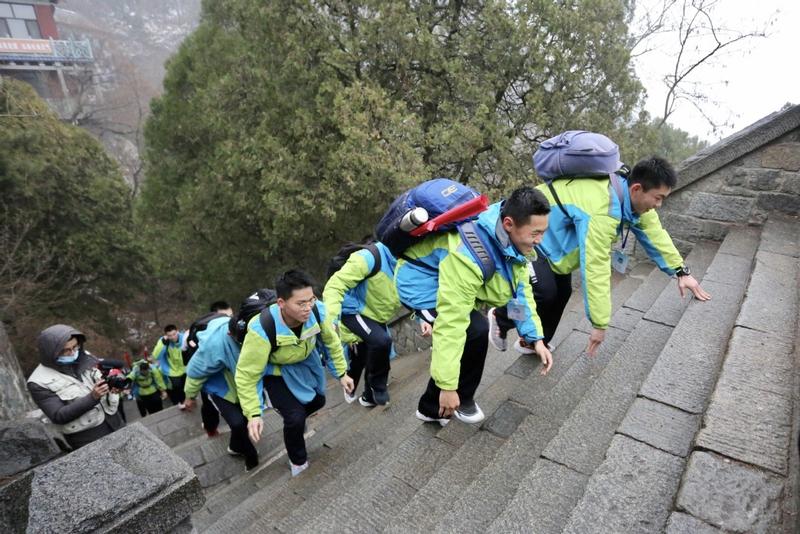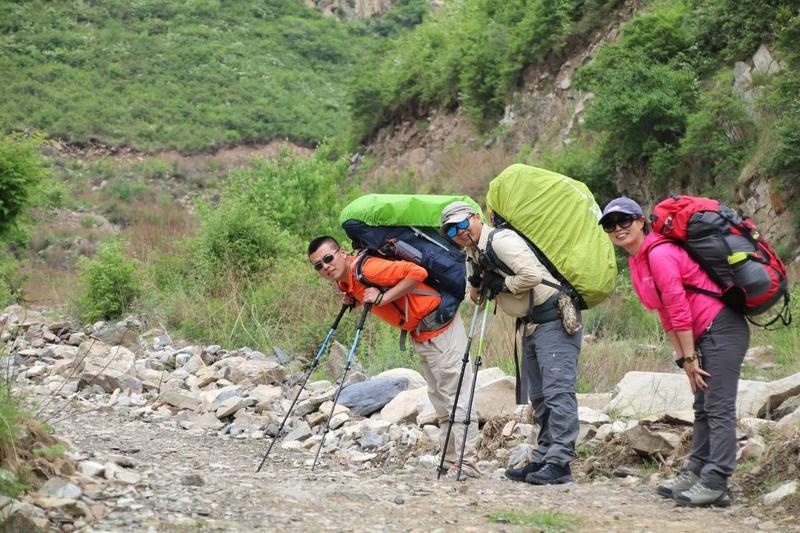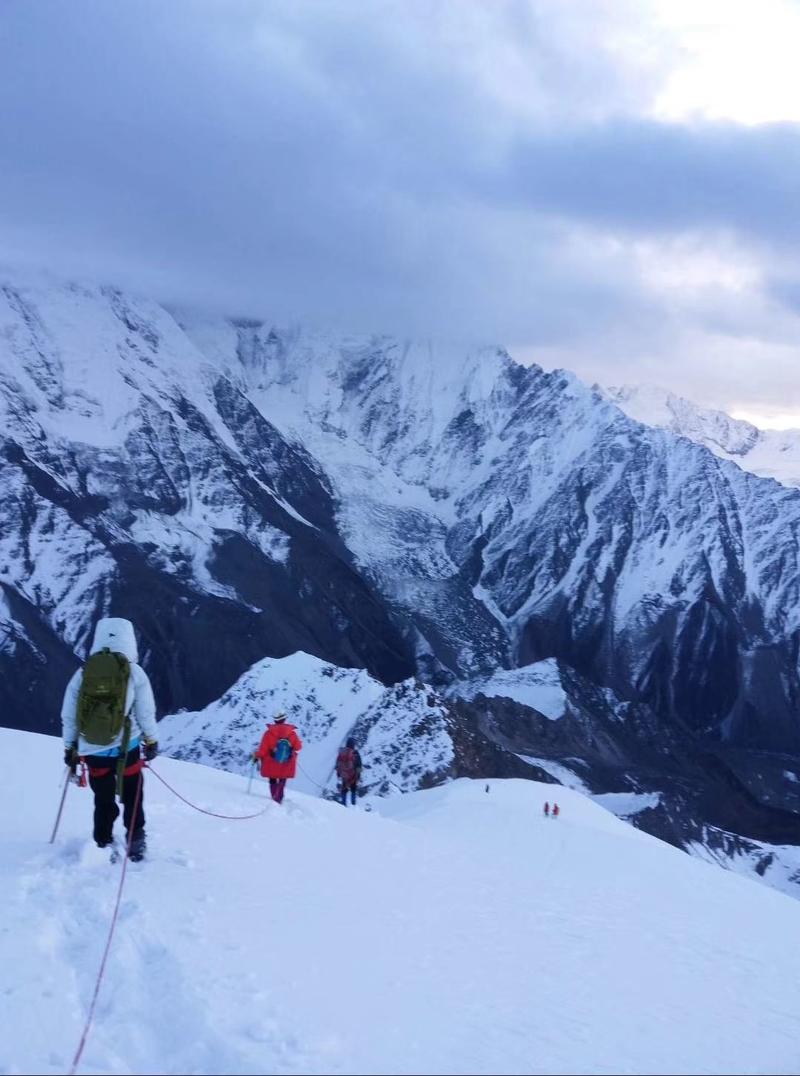 High school students in Tai'an, Shandong province, celebrate their coming-of age ceremony last month by climbing steps on Taishan Mountain in the province. (PHOTO PROVIDED TO CHINA DAILY)
High school students in Tai'an, Shandong province, celebrate their coming-of age ceremony last month by climbing steps on Taishan Mountain in the province. (PHOTO PROVIDED TO CHINA DAILY)
With COVID-19 cases largely under control in China in recent months, outdoor sports fans have seized the chance to embrace fresh air and natural beauty with their families and friends.
Be it hiking, climbing or even risky forays to snow-covered mountains, these enthusiasts believe that safety and environmental protection are important factors in such activities.
According to the annual China Hiking Tourism Development Report released in March, hiking is the country's most popular outdoor activity, as it involves encounters with nature and helps with mental and physical health.
The report said the most-searched cities for "hiking" were: Shanghai; Beijing; Guangzhou and Shenzhen, Guangdong province; and Chengdu, Sichuan province. Many hiking fans journey to locations with friends, clubs and travel agencies.
Their most popular destinations last year were the Xinjiang Uygur autonomous region, the Tibet autonomous region and Qinghai province. Hikers spent the most on transportation, accommodation and equipment, with outlays ranging from 1,000 yuan (US$155) to 10,000 yuan.
Li Xinjian, dean of the School of Tourism Management at Beijing International Studies University, said: "It's good that fans of outdoor activities attach great importance to responsible travel, which is conducive to environmental protection. It's also essential that visitors obey such unwritten rules for mass tourism."
"Safety is key to outdoor activities. You should never take a risk and should prepare well by using your ability and knowledge, by joining professional clubs and taking out insurance cover."
ALSO READ: Sports on the comeback trail
Li said the country's outdoor tourism rescue system should be improved by setting up more professional teams.
Wang Meng, 34, a mountaineering guide from Beijing, is pleased he successfully turned his hobby into a full-time occupation.
Like many of his peers, he has made numerous friends and even met his wife through climbing.
Wang used to work for a State-owned enterprise, which is considered a job for life in China. However, he wanted a different experience after developing a love for outdoor sports.
Four years ago, he quit his job and founded a small company to guide outdoor sports fans climbing mountains and on hiking trips in suburban Beijing and other cities.
Joining such activities offers good exercise and is a way to meet new friends and ease the pressures of daily life, he said.
"I have fun while doing my job. I like to enjoy beautiful rivers, mountains and make friends through outdoor activities."
Itineraries are based on the degree of difficulty involved. Some are suitable for newcomers and those with children, while others are only for experienced enthusiasts-for example, a two-day, 30-kilometer hiking trip to Mount Wutai in Shanxi province.
Wang said that in autumn people love to visit scenic destinations such as Pofengling and Tanzhe Temple in suburban Beijing to enjoy mountain views and the maple leaves. As mountain climbing in winter is more dangerous, with slopes covered in ice, he only arranges leisure trips for visitors to enjoy the snow.
He promotes guided tours on social media platforms and has built up a good online reputation, enabling him to attract clients.
Prices vary according to the itinerary. A one-day climbing trip over a distance of 10 km costs about 90 yuan, including transportation fares.
"People are now more eager to enjoy the beauty of nature after being forced to stay home for several months due to the COVID-19 outbreak last year. Parents arrive with their children to experience some simple routes because they want to look after their family's physical and mental health," Wang said.
He said it is essential to stretch the arms and legs before and after climbing. The right type of boots should be worn and climbers should also bring a pair of alpenstocks (long staffs) and some basic food.
As it is easy to become lost on a barren mountain, two guides-one leading the way and the other at the rear of a team-ensure that everyone follows the correct route.
Wang said common accidents on mountains include sprained ankles and injuries caused by falling rocks. A guide shoulders the huge responsibility of bringing all team members back safely, and must be familiar with routes.
"It's essential to follow the guide. It's dangerous to wander off at random. If you're lost, it's better you stay where you are until we find you," he said.
"In addition to physical strength, guides should have good interpersonal communication skills, as they need to talk with climbers. Sometimes they have to encourage them if they feel tired."
According to an African saying: "If you want to walk fast, walk alone. But if you want to walk far, walk together." Mountaineers such as Wang are strong believers in such advice.
He said a team once hiked 32 km in a day, which is hard for an individual to accomplish. Wang attributed this achievement to the fact that all team members encouraged and helped each other, and also shared their stories while climbing.
"Experiences shared with others are more enjoyable. There are countless touching stories among climbers. It's the process of communication that makes us friends, regardless of age or profession," he said.
Climbers share their food at lunch, as they have become friends after several hours on the slopes. Sometimes, they cook hotpot in the open air and pitch tents to spend the night.
"Environmental protection is important. We require our team members to bring their rubbish back with them," Wang said.
READ MORE: CMHK Hiking Festival promotes green tourism
 Visitors cross the Tengger Desert, Inner Mongolia autonomous region. The desert is the fourth-largest in China. (PHOTO PROVIDED TO CHINA DAILY)
Visitors cross the Tengger Desert, Inner Mongolia autonomous region. The desert is the fourth-largest in China. (PHOTO PROVIDED TO CHINA DAILY)
Rubbish removed
Like Wang, other outdoor sports fans are obeying the unwritten rules of environmental protection.
The 20-km-long Jiankou section of the Great Wall is known as one of the most dangerous outdoor hiking destinations.
Battered by years of wind and rain, it has fallen into disrepair, and visitors ascend it using their hands and feet to climb rough steps.
In 2013, a group of climbers calling themselves "the Giant Gooo-go Great Wall" started to visit the Jiankou section every Saturday to remove rubbish. They also used plastic bottles and cans they picked up to make badges printed with the group's logo.
The section was recently closed to climbers for the government to carry out repair work in an effort to restore the original appearance.
Zou Yi, 59, organizer of the volunteer group, said: "After seven years, we're glad that when we say farewell to Jiankou, it will be much cleaner and prettier than before, and that our work has impacted many others. We're a group of warm-hearted volunteers of different ages from home and abroad."
He said familiar routes are always the safest option, and volunteers help each other, especially newcomers.
Xu Guomei, 66, made her first trip to the Jiankou section with her daughter in 2013. She quickly fell in love with the picturesque area and became a member of the group.
"At first, I didn't understand why they were taking such a huge risk in climbing Jiankou, but after I gained first-hand experience, I understood this immediately," said Xu, who became a yoga teacher when she retired at age 50. Later, her husband joined the group to climb the section.
In the first few years, group members had to return with three or four bags of rubbish, including plastic bottles, cans, food packaging and cigarette ends.
ALSO READ: Fitness campaign to improve people's health
However, for the past two years, team members have only visited the section once a month, as the amount of rubbish has fallen significantly.
Xu said: "You can't be too careful, because it's dangerous to gather rubbish in places that are out of reach. Sometimes you have to use a rope or branch to get it.
"Our aim in visiting Jiankou is very simple-to collect rubbish. We're glad that our actions have impacted others, as climbers often imitate us when they see what we're doing.
"When people drop litter on Jiankou, they're hurting the next generation."
During festivals, the group sends daily necessities such as rice and cooking oil to families in financial difficulty in Xizhazi village, which lies at the foot of the Jiankou section.
In 2014, Yuan Fangchen, a middle-aged lawyer from Beijing, started to bring his 8-year-old son to Jiankou with the volunteer group. Yuan used to visit the section once a month and also went there with his wife and son several times a year.
"When my son first visited Jiankou, on seeing the steep cliffs, he was afraid to go one step further. I held his hand gently and encouraged him to ascend slowly with me. He soon learned the skills and started to enjoy it," Yuan said.
"Our regular visits to Jiankou have benefited my son greatly and have also been an opportunity for our family of three to enjoy life together."
Yuan said the visits to Jiankou have taught his son not to drop litter. The boy has also improved his spoken English, as sometimes they meet foreigners in the area.
"Jiankou is one of the most beautiful parts of the Great Wall in Beijing. The scenery differs throughout the year, and each time we visit it, we make new friends," he said.
"The Great Wall represents the Chinese spirit. Jiankou is a platform for those who love getting together. When we gather there, especially during holidays, we feel a strength of unity and patriotism."
READ MORE: Exercise and a good chair can help you thrive during likely long virus fight
 Chinese mountaineers climb Nochma peak in the Gongga Mountains, Sichuan province, in 2018. (PHOTO PROVIDED TO CHINA DAILY)
Chinese mountaineers climb Nochma peak in the Gongga Mountains, Sichuan province, in 2018. (PHOTO PROVIDED TO CHINA DAILY)
Scaling peaks
In 2016, Jiao Yang set out to climb the 5,588-meter-high Nochma peak in the Gongga Mountains in Sichuan province, but had to abandon the attempt just 200 meters from the summit due to low body temperature and altitude sickness.
It was the first time that she had tried to conquer a snow-covered mountain. However, the failure did not deter her.
Once you reach the summit, you become addicted to climbing such mountains. The higher I go, the happier I am.
Jiao Yang, Beijing accountant
Since then, she has reached the summits of three snow-covered peaks, including Nochma and the 6,168-meter-high Chola Mountain in Sichuan. She paid about 10,000 yuan for each trip.
"I was attracted by an online video of snowy mountain scenery, so I decided to see it for myself, but it never occurred to me that it could be such a hard journey," said Jiao, 37, an accountant from Beijing.
"Once you reach the summit, you become addicted to climbing such mountains. The higher I go, the happier I am," she said.
"The rolling mountains and patches of cloud contrast with the hustle and bustle of the city. It seems to me that these mountains, which have been with us for eons, represent eternity."
To improve her strength, Jiao exercises regularly by running with a heavy load. She also does speed-climbing.
In addition to rock climbing, she explores caves in outlying areas of Beijing with professional clubs. She uses ropes to ascend and descend into a 200-meter-deep cave, and sometimes removes rubbish from the interior.
"This is preparation for climbing an ice wall 100 or 200 meters high. If you fail to do so, you will be forced to give up halfway, as there is no other option," she said.
Jiao said it is important to climb snow-covered mountains with a qualified club, which will provide a professional guide, porters and horses to carry equipment. Local mountain climbing associations award certificates to those who reach summits.
A guide cooks simple dishes for team members and collects supplies from campsites on the mountains.
At higher altitudes, climbers eat instant noodles and canned food. If there is no water source nearby, they use melted snow. All rubbish must be left at fixed points before being taken downhill for disposal.
An itinerary ranges from four to six days. Team members pitch camp on the mountains and brave freezing temperatures to enjoy views of starry skies, including the Milky Way.
"Snow-mountain climbing challenges your limits in all respects," Jiao said, adding that it takes great determination to deal with altitude sickness, and climbers are also prone to headaches and nausea while ascending.
She said that to protect themselves from low temperatures, climbers should buy expensive equipment such as waterproof clothing.
Dangers can lurk in bad weather and other situations.
"Safety always counts. As a snow-mountain climber, you need to be aware of all the potential risks. In addition to regular exercise and the right equipment, you should always follow a guide's professional advice," Jiao said.
As team members descended Chola Mountain, heavy snowfall meant they were unable to find a rope laid down by their guide to indicate the route. They had to rely solely on the guide's sense of direction.
As they passed an area with cracks in the ice, they roped themselves together. Jiao accidentally fell into a hole in the snow, but her teammates immediately pulled her out.
She was planning to climb a snow mountain every year, but the pandemic halted her ambitions. Instead, she has exercised regularly in preparation for new adventures.
Contact the writer at xulin@chinadaily.com.cn


